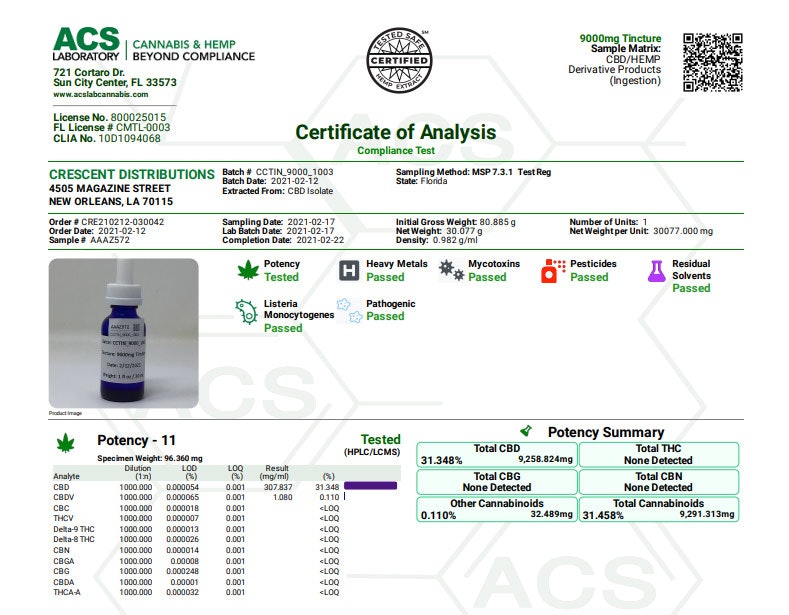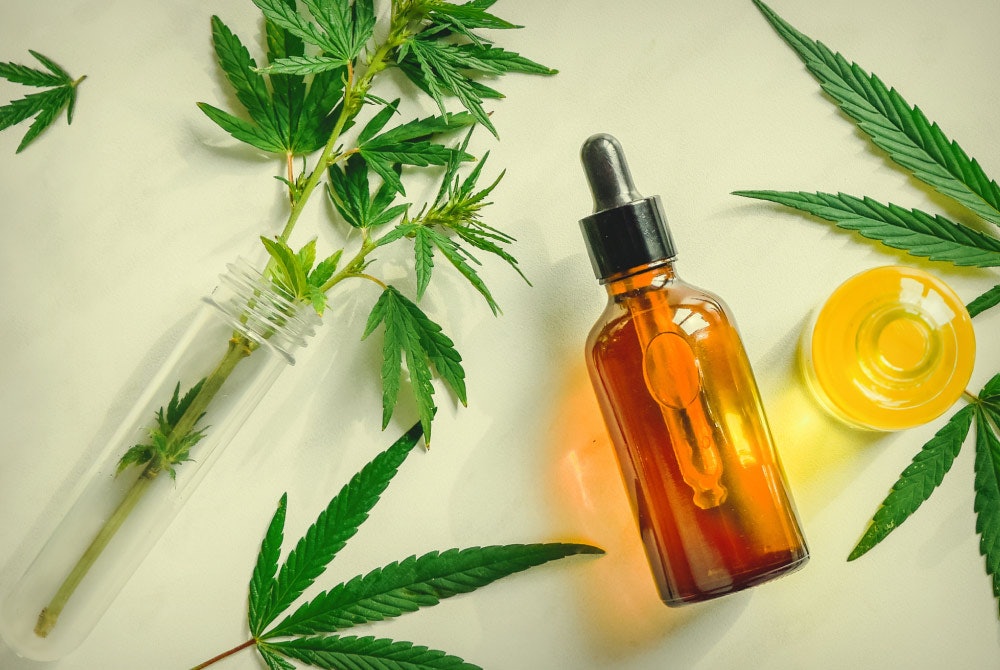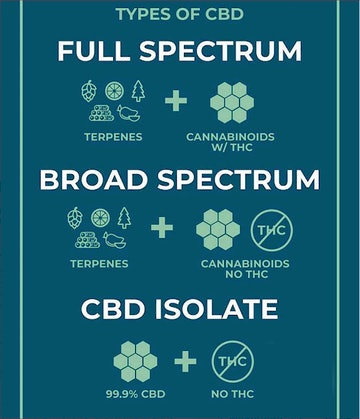- CBD Scams #1: Unsubstantiated Health or Product Claims
- CBD Scams #2: Lack of Independent Laboratory Testing Certification
- CBD Scams #3: Missing or Illegible Ingredient Panels
- CBD Scams #4: False Endorsements
- What is CBD Oil?
- How to Choose the Best CBD Products
- Frequently Asked Questions
Cannabis is bringing in billions of dollars annually, and there’s no shortage of products in the increasingly saturated legal cannabis space. Today, both brick-and-mortar and online shops have a wide range of cannabis-derived edibles, concentrates, and topicals. Of all these novel new health supplements, perhaps the most popular product by far is cannabidiol (CBD)—specifically CBD oil and tinctures.
It’s especially important for newer consumers to know how to select the right product. With such an extensive product selection within the CBD space, shopping with a solid idea of what you want is a time saver and can keep you from getting duped.
Here are three of the most common ways less reputable CBD companies market their products and how to ensure you get quality CBD products for your money.
CBD Scams #1: Unsubstantiated Health or Product Claims
It’s important to note that CBD has not yet been formally approved by the Food and Drug Administration (FDA) as a form of medication or treatment for any illness, except in the case of Epidiolex, which is a pharmaceutical-grade CBD for seizures.
CBD manufacturers making other health claims about their CBD products should be taken as a red flag because it is not allowed under current FDA regulations. No other CBD products have FDA approval.
Since regulations on the cannabis industry are still being hammered out, it's not uncommon to find an opportunistic CBD company trying to make hay while they still can. It’s better to take your time and thoroughly vet the CBD brand you decide to go with to avoid getting roped in by too-good-to-be-true claims of a potent cure-all.
If you come across a CBD oil that claims it has the most potent CBD oil in the world, make sure they can substantiate it with third-party lab testing certification. Otherwise, they're scamming you by making claims they cannot back up.
CBD Scams #2: Lack of Independent Laboratory Testing Certification
Third-party lab testing is a good indicator of the accuracy of a product label. Without this certification, there’s no way to confirm the ingredients in a CBD oil or their listed concentrations.
Certificates of Analysis (COA) show the test results of lab analyses done by a non-affiliated (third-party) lab on a specific product batch. COAs contain information on the tests performed, the results of those tests, and the specifications that were met. These are prepared by the lab and signed by a company representative.

A COA is an important quality assurance tool because it provides objective evidence that all label claims are accurate. For example, if a product is sold as “full spectrum” but the other cannabinoids are not listed at detectable levels in the COA, that’s a red flag.
COAs are typically prepared by laboratories specializing in testing products for quality assurance and can often be found in product inserts.
CBD Scams #3: Missing or Illegible Ingredient Panels
Ingredients and extraction methods should be clearly listed on CBD products. When shopping for a quality CBD oil, avoid overly minimalistic labels or mislabeled online cannabidiol products. Though safer formulations will tend to have shorter ingredients lists, the label or packaging should include every cannabinoid and terpene in the CBD or hemp oil, along with information about the extraction method used.
Avoid companies that don’t mention extraction and refinement methods. Some less expensive extraction processes may use dangerous solvents (e.g., ethanol, hexane, butane, propane) and can leave the resulting CBD oil infused with trace residue. If a CBD product claims to have undergone CO2 extraction, it will likely have a price point that reflects it, but it’s better to check for a COA to be sure.
Trustworthy companies will endeavor to showcase these product details because of the health implications. If a bottle is simply labeled “CBD Oil” with no additional information other than flavor, or even if its ingredients listing is vague or illegible, it’s best to move past that brand and look elsewhere.
The Shark Tank CBD Scam
Some CBD companies have made false claims that they've been featured on Shark Tank to generate more sales. Although these claims mainly involve companies trying to sell CBD gummies, sketchy or fake CBD companies may try the same technique to market their low-quality CBD oils.
CBD Scams #4: False Endorsements
There are some companies who make false claims that celebrities endorse their products. We've seen this happen numerous times before with other products, including diet pills. Sometimes, these aren't even legitimate companies, but scammers who are trying to steal your credit card information.
In one example, scammers used Dr. Oz and Dr. Phil to make their products seem legitimate. Both have come out to say they do not endorse or sell these CBD products.
What is CBD Oil?
CBD is a non-psychoactive cannabinoid found in the cannabis plant. It has a variety of potential medicinal applications, which has been shown to be effective in managing a wide range of conditions, including:
- Anxiety
- Depression
- Pain
- Insomnia
It's even become a popular remedy to treat ailments in our pets, especially cats and dogs.
CBD oil is non-addictive and has a low risk of side effects or adverse interactions with most medications.
CBD is commonly acquired from hemp strains that have been specifically bred to contain higher ratios of CBD, which can be extracted via several methods.
Generally speaking, there are three different types of CBD oil you can choose from. The type affects the product’s composition and the price, so it’s essential to know if you’re getting the product you actually want.
Does CBD Make You High?
Although CBD oil can come from the same plant that marijuana comes from, there is little to no THC found in CBD oil. THC is the psychoactive compound found in marijuana and is responsible for making you feel "high." At most, the amount of THC found in CBD oils is 0.3%, which is not enough to make you feel high. If your CBD comes from the hemp plant (vs. the cannabis plant), there is no THC.
CBD Oil Isolates
CBD oil isolates don’t include any THC (meaning these won’t get you high) or other cannabis compounds. A genuine CBD isolate will contain only CBD and a natural carrier oil like olive oil, hemp seed oil, medium-chain triglyceride (MCT) oil, or avocado oil.
CBD isolate is also referred to as pure CBD.
Broad Spectrum CBD
Broad spectrum CBD has more components of the cannabis plant still intact, namely the various terpenes, terpenoids, and flavonoids which also have their own health positive properties.
Many argue that this makes it more effective than an isolate due to the Entourage Effect, which describes the synergistic interactions between cannabinoids and terpenes. This type of CBD oil should be free of THC, as well.
Full Spectrum CBD
Full spectrum CBD is essentially a cannabis essential oil and contains all the components of the cannabis plant, including terpenes and THC. Therefore, it's almost the opposite of pure CBD/isolate since it includes all parts of the plant.
It’s believed to be the most potent and effective form of CBD oil for many conditions and has a higher risk of side effects.
How to Choose the Best CBD Products
Whether you're buying CBD oil, creams, or even treats for your dog, it's important to do your research to ensure you don't get duped by CBD scams. You'll want to look into both the CBD company and the product quality itself before purchasing.
Also, remember to check whether the particular CBD product is legal in your state. Unlike medical marijuana products, CBD is more accessible in the U.S., but local restrictions are still in place.
How to Vet a CBD Company
There are a few things to consider when deciding whether a CBD company is trustworthy and offers high-quality CBD oil. These include:
- Production and extraction process: You want to ensure they use safe methods and preferably locally-grown hemp.
- Third-party testing: The best companies in the CBD space will not only have their products tested by a third-party laboratory but will also post the results online.
- Customer reviews: If the CBD company you're considering has been around for a while, there should be no shortage of customer reviews. Make sure the CBD products they offer get positive reviews before buying them.
How to Choose CBD Oil
Once you've confirmed the CBD companies you're considering are trustworthy and offer high-quality hemp oil, you'll need to decide which hemp oil you should buy—there are many different options.
- Purpose: First, look at what you're buying CBD oil for in the first place. Many CBD oils will be marked for a specific ailment or condition, such as a sleep aid or pain relief. There are also options for overall wellness.
- Potency: CBD oil comes in different strengths. If it's your first time taking CBD oil, you probably want to start with a lower potency product, or you may notice stronger side effects.
- Type of CBD oil: Make sure you understand the differences between CBD isolate, broad spectrum, and full spectrum CBD oil. There are different benefits of each and may have different side effects. Learning about the clinical benefit of each will help you choose the best one for your needs.
- Ingredients: Hemp oil should have minimal ingredients. It's one of the purest CBD products on the market. You should avoid CBD oil with questionable ingredients.



Comments